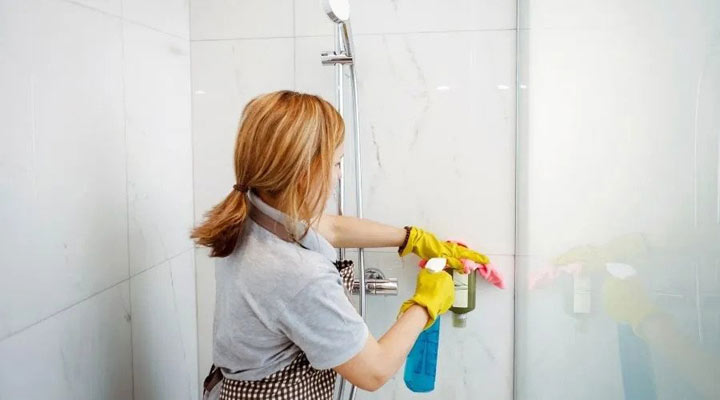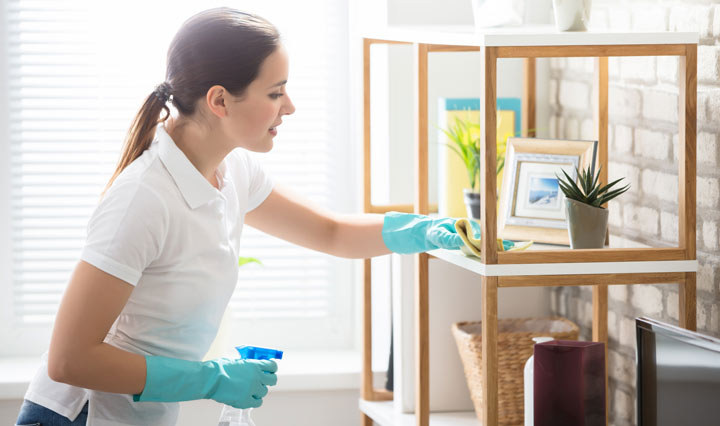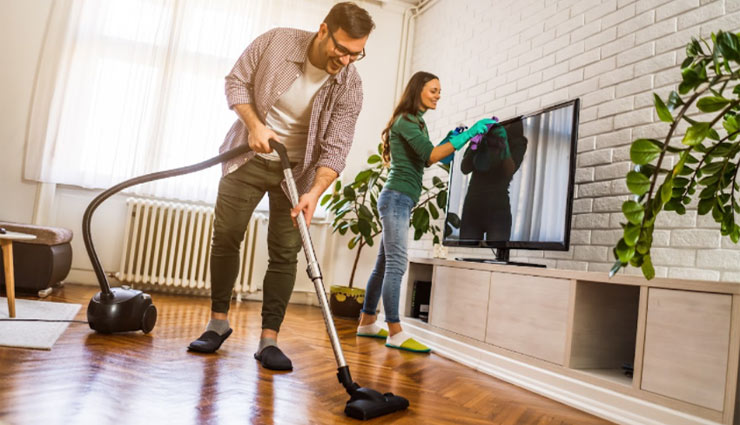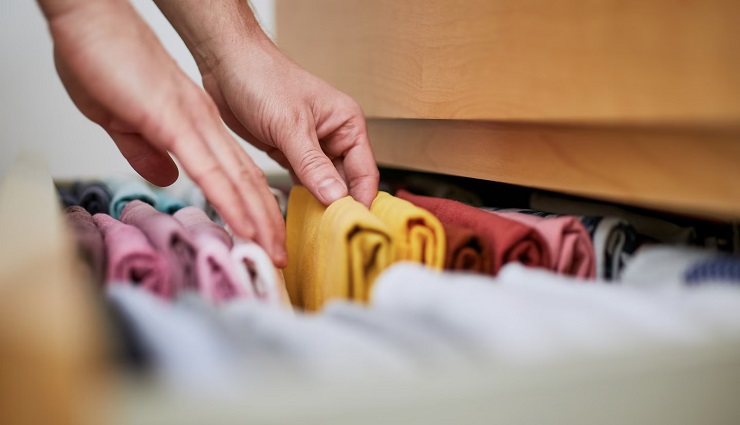House cleaning plays a vital role in maintaining your health. Doing this prevents the growth of bacteria, viruses, and other pests. In addition to the health benefits, looking at a clean and tidy home gives you a relaxing feeling. In this article, we will tell you tips about cleaning the house to maintain the health of family members and the benefits of a clean house. Stay with us.
Cleaning the kitchen
The kitchen is one of the most likely places to transmit viruses such as Corona into the home. According to a 2020 study, the virus can survive on many kitchen surfaces for hours or days.
Some tips for disinfecting kitchen surfaces and preventing virus transmission:
- Wash your hands with soap and water for 20 seconds before touching anything, especially if you’ve been outside or at work.
- If soap and water are not available, disinfect your hands with a 60% (or higher purity) alcohol-based hand sanitizer.
- Clean all kitchen surfaces regularly, including counters, tables, stove or microwave knobs, and any other characters you touch frequently.
1. Scotch cleaning dishwasher
If the Scotch is not properly washed and cleaned, thousands of microbes, molds, and pathogens in the food may stick to it. Things you can do to kill germs on Scotch include:
- Place the Scotch in the dishwasher and set the machine to high heat and the dryer cycle.
- Wet it and put it in the microwave for 1 to 2 minutes.
- After each use, squeeze it well and place it where air flows and dries.
Cloth towels may contain unhealthy microorganisms, Even if they are only used to dry clean dishes. Wash them also by setting the dishwasher on high temperature.
2. Cleaning the cutting board
Never cut fruits or vegetables on the same cutting board you use to cut raw meat. Having two cutting boards is a good idea; One for raw meat, one for fruits and vegetables, and everything else.
Store raw vegetables and meat separately to avoid the possibility of food contamination with salmonella, E. coli, and other harmful bacteria.
Wash the cutting board with warm soapy water before use.
3. Cleaning the kitchen counter
Clean and disinfect the entire counter surface after cooking. This kills food-borne bacteria such as Campylobacter (a common cause of diarrhea ). In addition, cleaning the counter does not leave food residue on it and does not become a gathering place for insects.
Immediately after eating, transfer leftover food to closed containers and throw food waste into a secure trash can. By doing this, you prevent the invasion of insects.
Cleaning the bedroom
Dust, mites, dead skin, fungus, and pet dander are always present in your bed and can make you sick and cause allergies. Some tips to get rid of mites are:
- Use a zippered plastic mattress pad and pillowcase.
- Wash all bedding with hot water once a week.
- Vacuum mattresses without covers regularly.
Cleaning the bathroom and toilet

One of the reasons people used public bathrooms in the past was to keep germs and waste away from their living quarters, but today, the bathroom is indoors, and germs may be lurking.
1. Cleaning the handle of the flash tank
Sure, you clean and disinfect the toilet occasionally, but do you also clean the handle of the flush tank? This part, which no one usually tends, may be where rotavirus, enterococcus, and other pathogens accumulate.
Enterococcus may cause bacterial gastroenteritis. Rotavirus is the most common cause of diarrhea in children. The coronavirus can survive for up to 3 days on the metal and plastic handle of the flash tank.
Disinfect the handle of the flash tank with a suitable disinfectant to kill viruses and bacteria.
2. Cleaning the floor to the ceiling of the bathroom
Mold can grow and multiply in the toilet, leading to many health problems, from runny and itchy eyes to asthma attacks.
Another pest that exists in the bathroom and probably throughout the house is Trichophyton. This fungus causes ringworm and “athlete’s foot” and may be transmitted from one person’s foot to another through the soles of the feet. Some tips to eliminate mold and Trichophyton are:
- Use a disinfectant designed to kill mold and mildew in the bathroom.
- After bathing or showering, wipe the wall, rain, and shower curtain with a towel or scotch tape. You can even throw some shower curtains in the washing machine.
- Dispose of dirty tissues and empty the wastebasket daily.
cleaning the house
1. Cleaning door handles
Door handles can quickly get dirty. Handles are the place where Staphylococcus aureus bacteria accumulate. Although Staphylococcus aureus is not dangerous, it can cause many problems if it gets into the mouth, eyes, cuts, or scrapes.
When you return home, if you touch the doorknobs before washing your hands, viruses such as Corona will also stick to the doorknobs at home. Cleaning the door handle with an antibacterial solution or 60% alcohol will kill Staphylococcus aureus and other harmful microorganisms.
2. Cleaning the walls
If the walls could talk, they would probably ask you to reconsider your choice of paint type. Paints contain volatile organic compounds (VOCs), responsible for a large part of indoor air pollution. To reduce exposure to these toxic fumes, buy colors with less volatile organic compounds.
3. Carpet and rug cleaning
Many double-sided adhesives that stick under carpets and prevent them from moving contain the same organic compounds found in paints. Some people experience flu-like symptoms after laying on a new rug; others complain of burning eyes, nose, and throat. A few points about health issues related to volatile organic compounds in the rug and carpet glue are:
- Before laying the new mat, open the door and windows and turn on the fan to change the air in the room.
- Vacuum the carpets regularly to reduce allergic reactions to dust.
- Open the doors and windows every morning to freshen the air, especially after laying down a new carpet or painting the walls.
- Use an air purifier or houseplants to filter out toxins and any harmful compounds in the air.
4. dust cleaning

Sometimes we think the dust on any surface and somewhere in the house is a kind of ordinary dirt, and we clean it with a tissue, but the matter is more severe than these words.
A vacuum cleaner is like a “chemical parking lot” in your home. In a 2016 study, researchers identified 45 extremely harmful chemicals in household dust. According to this review, dust may lead to many health problems, including:
- allergy ;
- Asthma;
- respiratory problems;
- types of cancer ;
- Genital and nervous system diseases.
These effects may increase in winter as we spend more time indoors. To protect yourself from the adverse effects of dust, clean your house regularly and maintain proper ventilation.
Health benefits of a clean house
1. It makes you sleep better
According to a recent study by the National Sleep Foundation, 45% of people have sleep disorders. The truth is that our mind is always full of thoughts that don’t let us sleep, and interestingly, the messiness of our bedroom also fuels these thoughts.
According to a survey by the National Sleep Foundation, those who regularly wash their sheets and clean their rooms sleep better. A clean house equals a pure mind!
2. It improves your mental health
When the house is messy and dirty, you feel depressed and anxious. Seeing clothes lying on the couch, children’s playbills, and dirty cups on the counter can make you feel stressed. This makes parts of our brain still involved in this mess.
According to research at Princeton University, clutter may affect the visual cortex. This is not the only research that has been done on the effects of disorders on mental health. According to many psychological studies, a tidy, clean space makes us focus better and less anxious.
3. It makes you make healthier food choices
According to many types of research, messy, dirty, and even smelly spaces make us feel anxious and stressed, and usually, when stressed, we make inappropriate food choices. When you look at the matter from this point of view, you can easily conclude the opposite of this case: a clean and tidy house gives you better eating habits and an overall healthier lifestyle.
According to a study published in the journal “Psychological Science” in 2010, people who live in a cleaner environment eat healthier foods. A dirty kitchen destroys a person’s desire to cook or eat healthy food.
4. It saves money
House cleaning saves you money in several ways :
- When you keep your home clean, you’ll need less expensive cleaning products because dirt won’t build up so much that you need strong cleaning products.
- Walking around the house, the dirt on the wooden or ceramic floor acts like sandpaper, scratching and dulling the surface. Soap and water deposits may also darken the surface of the bathroom tiles. Keeping surfaces like floors, kitchen counters, and bathrooms clean will keep them looking beautiful and new for longer.
- Keeping household appliances clean also increases their durability and saves money on repairing appliances.
5. Reduces seasonal allergy symptoms
Keeping your home clean, including regular vacuuming, dusting with a damp cloth, changing bedding regularly, and cleaning areas prone to mold growth, such as bathrooms, can help reduce seasonal allergies.
final word
Cleaning your home has many benefits, from keeping germs at bay to increasing happiness and peace. Are you one of those people who relax by energizing the house after cleaning? By reading this article, you realize that this feeling of peace resulting from a clean house has even been proven in scientific research.
If you care about your and your family’s mental and physical health, divide the tasks and always keep your house clean by planning.
you say
What other solutions or tips do you have for cleaning the house? Please share your valuable comments and experiences with our dear users and us.



